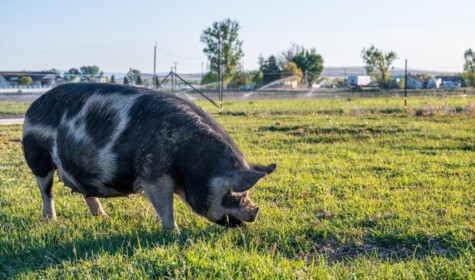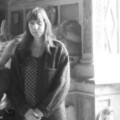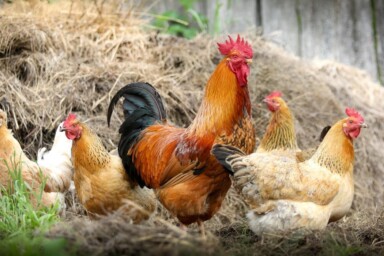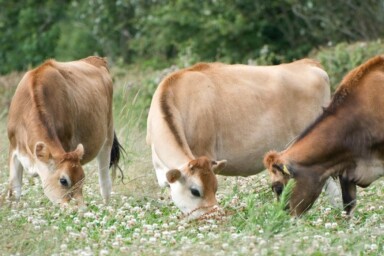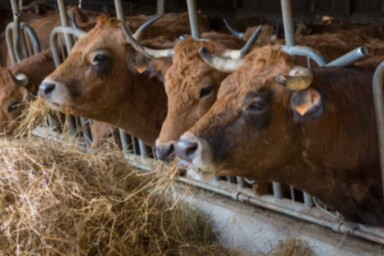‘They are tiny, but they are mighty’. That is how Sally Ann Spence described the diminutive dung beetle in a session that unexpectedly turned out to be my highlight of the Oxford Real Farming Conference (ORFC) 2022.
For the second year in a row, COVID-19 had forced the conference to go online. This was something of a double-edged sword for me. On the one hand, technology cannot replace the atmosphere of Oxford Town Hall crammed with a diverse mix of enthusiastic delegates. On the other, I was struggling to keep all my plates spinning, with a complex grazing crisis and a family bereavement threatening to scupper my attendance entirely. This way, I had a chance of attending at least some of the sessions.
Things started well. In Healing Our Connection with Food in the Fake Food Era, the breathtaking enthusiasm of Vandana Shiva ripped through the old dogma that would have us believe only biotech companies can adequately feed the world. Balanced by the calm statesman-like presence of former Jain monk Satish Kumar, an eloquent case was made for re-establishing our ’connection with eating as an ecological act in defiance of the false solutions that separate us from life and nature’.
I first came across Satish Kumar forty years ago when, as an idealistic teenager, I volunteered at one of the early Schumacher Lectures. Then, I was in awe of the towering figures of speakers such as the American Indian Movement’s Russell Means. Satish was kind and generous with his knowledge and oversaw everything with a quick but calm efficiency. Now I am less easily awed, but have retained that idealism, believing in a sustainable future for our planet and ourselves. I was delighted to see that Satish, at the age of 85, had lost none of his sparkling campaigning spirit.
On the second day of the conference, I opted for three practical sessions out of an extensive and somewhat bewildering choice. This is where the mighty dung beetle came to the fore.
Canadian First Nations Chief, actor and poet, Dan George says in his beautiful, moving book, My Heart Soars, ‘Little things are important. Because they are little, we see them but we do not understand them.’ This came back to me as Sally Ann Spence explained, with extraordinary clarity and simplicity, just why dung beetles are so important. Not only do most of us not understand them but to see them you have to be prepared to really look. Spence made it easy for us, running quickly through types of dung beetles preferred habitats (‘a tower of dung is more suitable than a splatter’) and the mind-boggling array of life, both above and below ground, that depends on this ‘keystone species’.
It was a session that made you think very carefully about how to manage your land and livestock. Along with co-speakers, Bruce Thompson, Claire Whittle and James Allen, Spence helped us negotiate the perils of chemical treatments, grazing patterns and habitat loss. Thompson gets the prize for deadpan humour when, explaining that dung beetles are often species specific, told us that Australian dung beetles were not impressed with the alien livestock of European immigrants –‘They took one bite out of the new dung and thought it tasted like crap!’
Joking aside, the difficulties caused by the relocation of large numbers of grazing animals have been sufficient to require the import of dung beetles to Australia, at significant cost, since the 1960s. I’m sure Bruce Pascoe, (whose session on First Peoples’ approach to agriculture was sadly cancelled), would have an opinion on this.
My other two sessions of the morning were Hedgerows – The Green Veins of Our Landscape and the rather clumsily titled How Meadows and Healthy Soil Can Fight Climate Change as well as Reconnect Us to Cultural Landscapes. Again, these were detailed and practical, giving much food for thought on how we can improve the carbon storing potential and biodiversity of our own farms.
In the afternoon, I had to take a break from the day’s sessions to help my cousin with the plans for my uncle’s funeral. It would be easy to imagine this to be an incongruous turn of events in the middle of a farming conference, but it felt strangely appropriate. My uncle was a true countryman in every way. He was old enough to remember the days of riding the draught horse to the village smithy and taking calves to market by horse and cart. ‘Going along quietly,’ he liked to say, meaning steadily and unhurried, in the West Country sense of the words. Of the many tributes that have come to us since his death, this from a neighbour, summed up the consensus of opinion: ‘Such a character – a lovely, gentle, talented man. One of the old village stalwarts and we were privileged to know such people. The young now don’t have many role models like this.’
My uncle was a practical and unsentimental man whose life was framed by the rhythms of the year. I believe it is important that, while we strive to turn the trajectory of farming from the suicidal course that it’s been on for over half a century, we remember to listen to the quiet native voices of our countryside. Although the life of a man is brief and death is natural, we cannot afford to let the knowledge handed down through centuries come to an end at this critical time.
Indigenous Concepts of Wellbeing in Relation to Food and Agriculture took me back to the conference. My uncle would have fitted in well with Alfredo Cortez, Gerald Miles and Iwan Evans Coedfadre whose understanding of ‘the old way of thinking’ is now being passed on to a new generation. Gerald’s 20-year search for the black oats of his ancestors is detailed in the beautiful short film, Llafur Ni (Our Grains). He believes that ‘these old ways are going to create food for us in this world we live in, where we have disease and the weather changing’. ‘This,’ he concludes, ‘is more important than we realise’.
Whether it is from Wales, Guatemala or Malawi, the quiet voices need to be heard. In the film, The Ants and The Grasshopper, the remarkable Malawian farmer and activist, Anita Chitaya, takes her campaign for climate justice from rural Africa to America. Travelling across the United States, Anita attempts to use her impressive powers of persuasion to convince farmers, politicians and sceptics of the reality of climate chaos and the need for many of them to change their ways. With disarming simplicity and understated intelligence, much of what is at the source of the crisis reveals itself under Anita’s patient gaze.
On the final day of the conference, real life and real farming finally prevailed. I found myself back out in the horizontal rain. I have many sessions to catch up on once the recordings are released but I have seen enough to be going on with.
In Malawi, an ant cannot move a grasshopper alone – it takes cooperation among many ants to do that. ‘They are tiny but they are mighty.’
So, are we.
